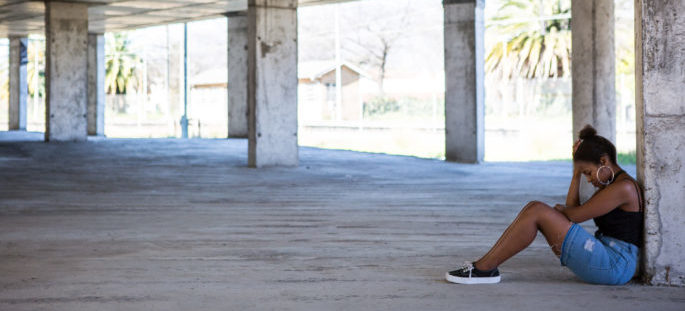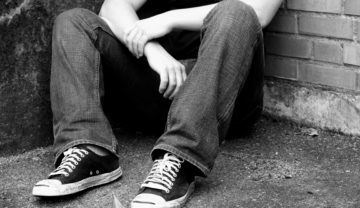Trafficking
Many people don’t know that a person does not actually have to move anywhere (i.e. from another country or state) to be trafficked. The law states that someone has experienced trafficking when they have been made to do something against their will through force, fraud or coercion.
Trafficking can also overlap with domestic violence. An intimate partner may exploit the person in order to force or manipulate them to perform acts of labor, sex, or both. Often victims, or survivors, of trafficking are made to work in the sex trade, massage parlors, escort services, pornography, or sweatshops. In most cases, pimp-controlled sex work is considered trafficking.
Young people who run away from home may end up engaging in sexual acts as a way to survive. They may trade sex for food, money, a place to sleep, or other basic needs. If you have experienced sexual or labor exploitation and are under 18 years of age, there does not need to be proof of force, fraud, or coercion in order to meet the legal definition of a trafficking victim.
What can force, fraud, and coercion look like?
Examples of Force:
- Threatening with physical, verbal, sexual, and emotional violence
- Drugging in order to impair the person’s judgment
- Monitoring and controlling the person’s every move
- Damage to property
Examples of Fraud:
- Keeping the person in debt
- Taking or keeping a person’s passport, identity, other important papers
- Taking a person’s phone and ability to connect with others
Examples of Coercion:
- Making false or misleading statements to lure the person into sex work (i.e. “You only have to do this for a little while until we build up enough money to start a business,” or, “This is what everyone has to do if they want to become a model.”)
- Damaging a person’s sense of self-worth in order to gain control
- Exposure of secrets, or threat of exposure of secrets, that compromise the person’s physical, sexual, or emotional safety
- Making other promises that don’t come true
Regardless of your age, if you are being trafficked or trading sex to survive, there is help. Here are resources to help you get into a safer, more stable place. Street outreach programs and housing options are on offer through a number of different organizations and government programs. It can be uncomfortable and scary to share with others the details of what’s going on. However, being specific about your experiences of sexual and/or labor exploitation could help open doors to support services that otherwise might not open as easily.
Resources
IF YOU ARE IN IMMEDIATE DANGER, CALL 911.
National Runaway Safeline
1-800-RUNAWAY
National Human Trafficking Hotline
Call 1-888-373-7888 or text Help to 233733 (BeFree). The Hotline offers round-the-clock access to a safe space to report tips, seek services, and ask for help. Hours of operation are 3:00 p.m. – 11:00 p.m. ET.
Safe Horizon
Call their 24-hour hotline if you need help, 1-800-621-4673. Safe Horizon’s Anti-Trafficking Program works to help you take back your freedom. The program advocates for you in the criminal justice system. It also provides linkage to housing and access to public benefits.
GEMS
Girls Educational & Mentoring Services (GEMS) in New York City provides services including short-term and crisis care, court advocacy, transitional and supportive housing, and case management. GEMS also educates girls and young women on the dangers of sexual trafficking. Call 212-926-8089 or fill out the Victim Referral Form.
STEPS to End Family Violence
STEPS offers free and confidential counseling, advocacy, and case management services to survivors of trafficking and other forms of gender-based violence in New York City. To reach someone for more information or to make a referral, call the STEPS Helpline: 877-STEPS-94 (877-783-7794) Mon-Fri, 9am to 6pm.
The Legal Aid Society Exploitation Intervention Project
The Exploitation Intervention Project (EIP) at the Legal Aid Society (LAS) provides direct legal representation and comprehensive services to individuals charged with prostitution-related offenses and survivors of trafficking facing prosecution for other offenses in New York City’s criminal courts.
If you think that you might have experienced trafficking through either force, fraud, or coercion into sex or other work, EIP can connect you to services to address needs such as medical care, emergency shelter, and educational programs, as well as related legal services including immigration, public benefit assistance and family law. Contact: Leigh Latimer, Supervising Attorney, phone: 718-286-2307 email: lelatimer@legal-aid.org
My Sisters’ Place
My Sisters’ Place offers comprehensive services for survivors of trafficking and survivors of domestic violence in Yonkers and White Plains. Call their hotline 1-800-298-7233 (SAFE) to learn more about their shelters and non-residential counseling services.
Womankind
Calling Womankind’s 24-hour, multilingual, free helpline opens the door to all the services of Womankind. You can reach them at: 1.888.888.7702
Highly trained helpline advocates can answer general questions about domestic violence, human trafficking, and sexual violence across the lifespan. They speak English, Spanish and 18+ Asian languages and dialects, including Chinese, Korean, Japanese, Tagalog, Hindi, Urdu, Bengali, and Vietnamese.
Human Trafficking Resource Center (outside of New York State)
Call 1-888-373-7888
New York State Human Trafficking Providers has resources by county.
This information is not intended to provide medical advice, professional diagnosis, opinion, treatment or services, only general information for education purposes only.


